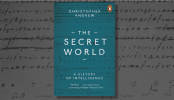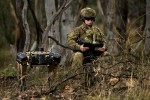Search
Using the filters to the left, click your selection, it will become bold and filter the results, click it again to remove that filter.
Collective training in the Australian Army is undergoing a process of fundamental change. Over the next four years, the Army will introduce a live Combat Training Centre (CTC) in a revolutionary approach to readiness evaluation. The new initiative builds on the success of an Interim Combat Training Centre project and is aimed at preparing Australian soldiers for the new and diverse challenges of military operations in the 21st century. The new CTC is expected to use advanced exercises against a notional …
The Media in its Present Form The traditional concept of the media has been substantially eroded over the past decade with the emergence of a disturbing new trend. In a potentially confusing marriage of fact and fantasy, the entertainment industry has tightened its grip on the companies that produce news worldwide. CNN is now owned by Time Warner, of Warner Brothers fame, the 26 billion-dollar group that brought the world the Harry Potter phenomenon. The American ABC is owned by Walt Disney, the 23 …
On 11 September 2001, the United States homeland was subjected to a complex, coordinated and devastating terrorist attack. In less than two hours, New York’s World Trade Center and a portion of the Pentagon had been destroyed, and four commercial airliners had been lost with all passengers and crew. The death toll from these attacks was over three thousand, causing the United States to respond to the tragedy by declaring a ‘war on terrorism’. President George W. Bush stated that the elimination of …
This article is about contemporary dismounted infantry tactics. It argues that the Australian Army should reconsider some aspects of its approach to manoeuvre and suppression in the close battle. The article does not argue for a particular solution. Rather, it highlights some apparent problems with our current doctrine and poses a challenge to innovate, and to debate the issues. The aim is to encourage professional debate about tactical innovation within infantry. Whether that debate takes place in the …
Since becoming Chief of Army in the middle of 2002, I have been guided by a core question: ‘How will the Australian Army operate in a post-Cold War world of failing states and non-state actors?’. At the beginning of the 21st century, there can be little doubt that the Australian Army faces an environment in which the forces of globalisation and fragmentation are simultaneously challenging many of our traditional ideas about the character of military power. We are faced with multiple challenges across a …
On the eve of Operation Iraqi Freedom on 19 March 2003, the Commanding Officer of the British Army’s 1st Battalion of the Royal Irish Regiment, Lieutenant Colonel Tim Collins, addressed his 800 soldiers at Fort Blair Mayne desert camp, some 20 miles south of the Iraqi border. The rousing speech was commended by the Prince of Wales and was circulated by the White House. It is published here with the kind permission of the British Information Services. 1 We go to liberate, not to conquer. We will not fly our …
The phrases niche force or niche capability are currently being bandied about as a way to describe current Australian contributions to coalition operations. In a military, if not political, sense this concept may lead to the stagnation of the Army’s ability to conduct military operations. The concept of a ‘niche force’ is founded on the notion that it is appropriate to make force contributions whose specific capabilities are disproportionate to the actual investment of resources and personnel. This …
A History of Intelligence Penguin Press, New York, 2018, 948 pp Paperback ISBN: 9780140285321 eBook ISBN: 9780241305225 Author : Christopher Andrew Reviewed By : Dejan Mujkanovic Christopher Andrew's The Secret World: A History of Intelligence provides an overview of the evolution of intelligence tradecraft and related disciplines throughout history by examining the relevance of intelligence to decision-making from ancient to modern eras. Andrew is an Emeritus Professor of Modern and Contemporary …

Lieutenant Colonel Dejan Mujkanovic is an Australian Army officer. Dejan has extensive experiences in intelligence, surveillance and reconnaissance capabilities, commanding across echelons at Battalion-level and below. His operational experiences include deployment to East Timor as well as several deployments to Afghanistan. … Dejan …

